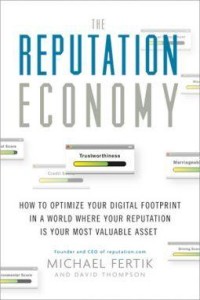In the digital world, people are evaluated based on their virtual footprint. A wild photo of you on your Facebook page or use of excessive foul language can easily hamper your chances of getting a job. Reputation, of course, is built on what others say about you. And getting mentioned by the influential or peers in good light goes a long way. Do you think about this when you post a message or request a recommendation? How do you ensure that you maintain a clean and positive reputation in the virtual world.
 The Reputation Economy: How to Optimize Your Digital Footprint in a World Where Your Reputation Is Your Most Valuable Asset
The Reputation Economy: How to Optimize Your Digital Footprint in a World Where Your Reputation Is Your Most Valuable Asset
Authors: Michael Fertik and David C. Thompson Pages: 256 pages Publisher: Crown Business (January 20, 2015) Language: English ISBN-10: 0385347596, 978-0385347594 Read Sample
The author begins with drilling home the point of how important your reputation will be in a reputation economy. The scope of reputation was limited to getting job, a good wife, and perhaps loan from a local bank. But now nothing is local. Your every action online adds to your reputation. The author informs us that consumer companies, banks, and insurers are already looking at your social data to decide on your premium, interest rates, and special offers that you are eligible for.
In Scored, the author says that everything that can be recorded will be recorded and then scored. The machine is everywhere, every hour, every day. Although this method of scoring might not be foolproof yet, companies will increasingly depend on these data to make a decision about you.
I hear you. You are thinking you won’t post debatable stuff to Facebook and other social media accounts. But what about your friends. I was constantly reminded of ‘Birds of feather flock together’ when I was in school and warned about carefully choosing the people I hang out with. Well that’s what these all-pervading algorithms will turn to if they do not get the full picture from your virtual footprint.
But if it is an algorithm, it will work to the rules. It cannot evolve. It will record only what you feed and the game is not entirely lost. In the last two chapters, the author explains how you can work toward building a good reputation. He shows this with an example of how Hyundai changed the conversation and its brand perception in the US.
A quick read, The Reputation Economy shows you all that is happening with your personal information in the cloud and where this data use is headed. It may not impact you that much right now, but soon you will find that your actions sitting in your room, when nobody is watching, are shaping multiple decisions about what you are offered and the opportunities that you will perhaps never see.